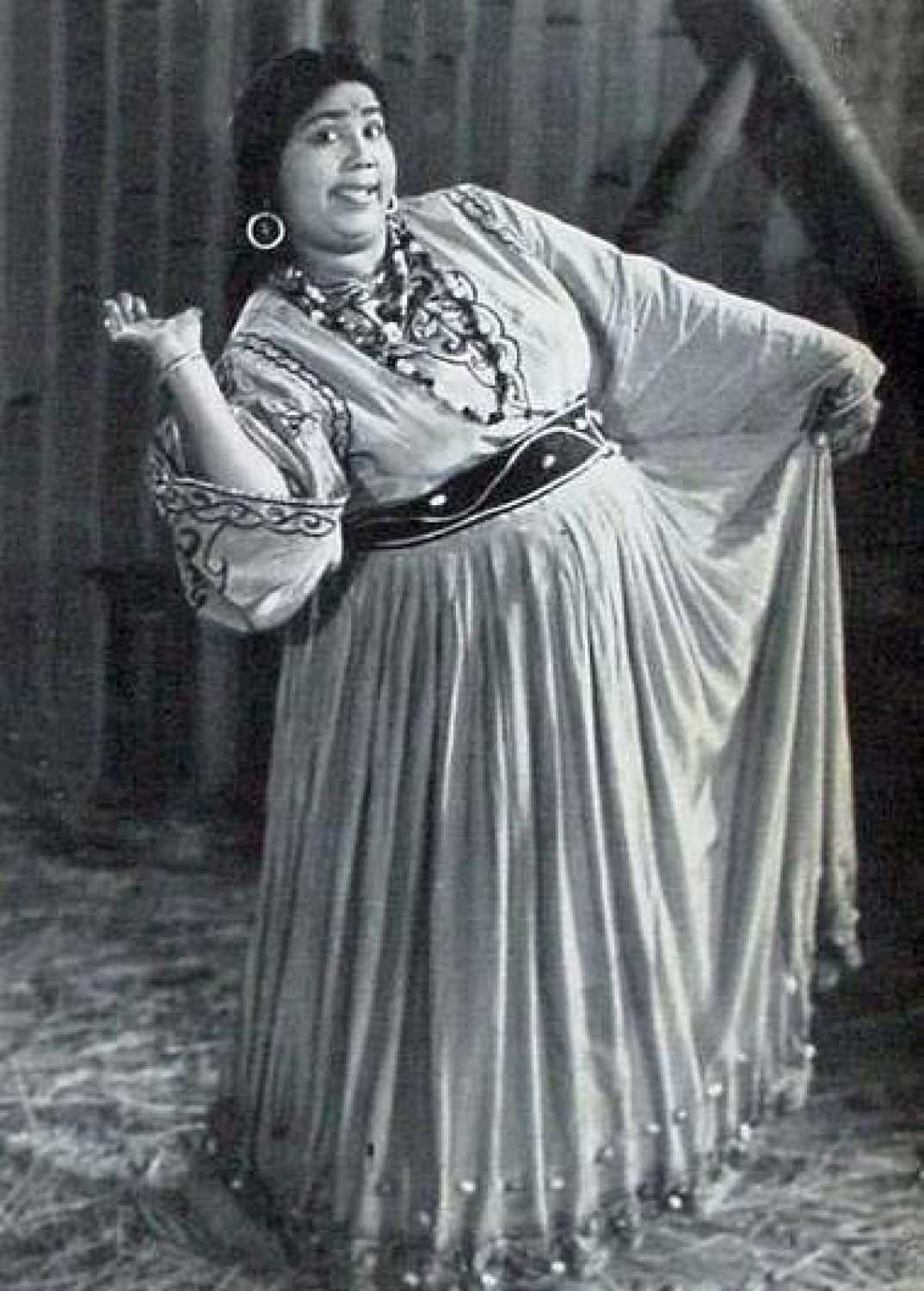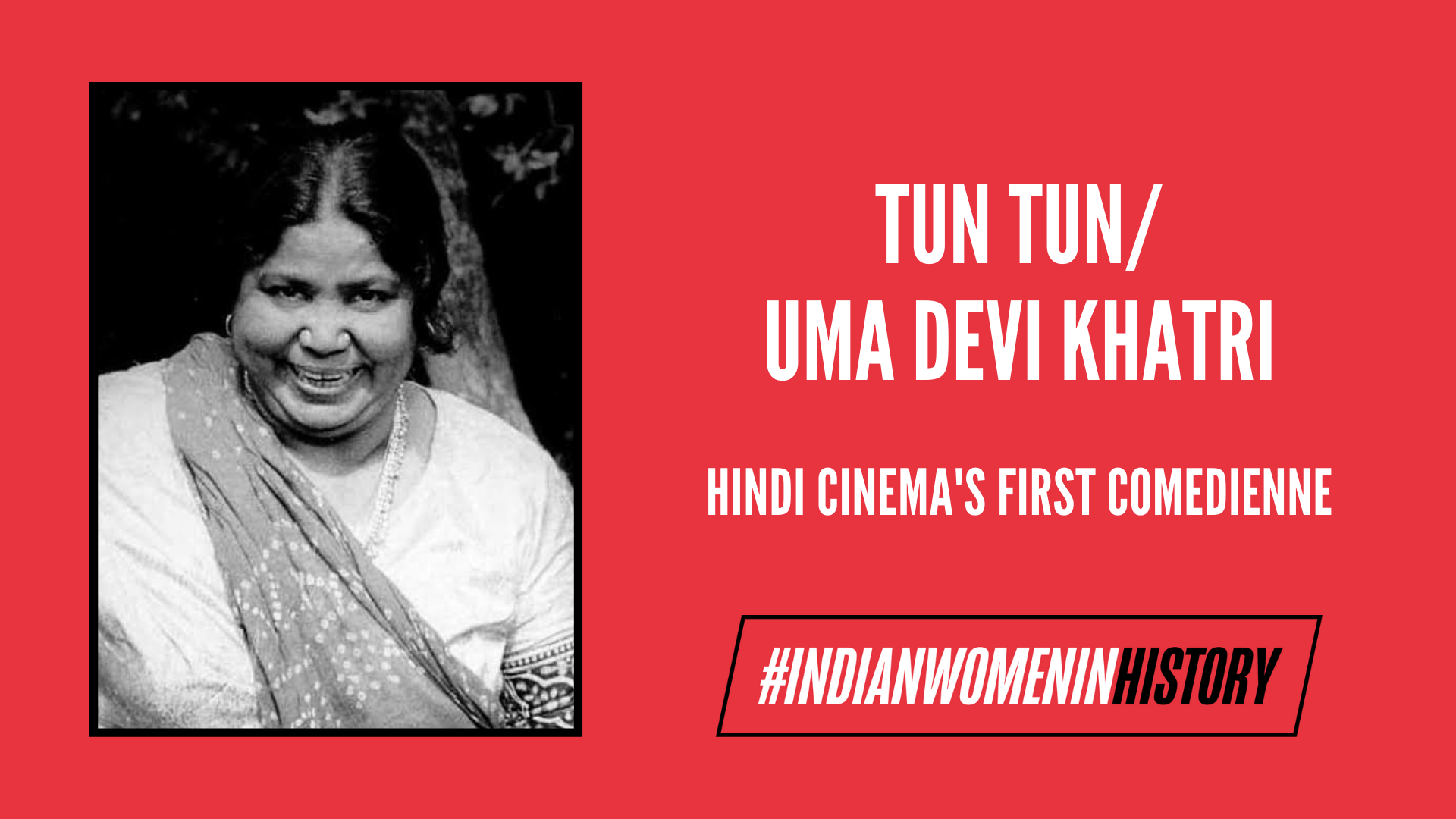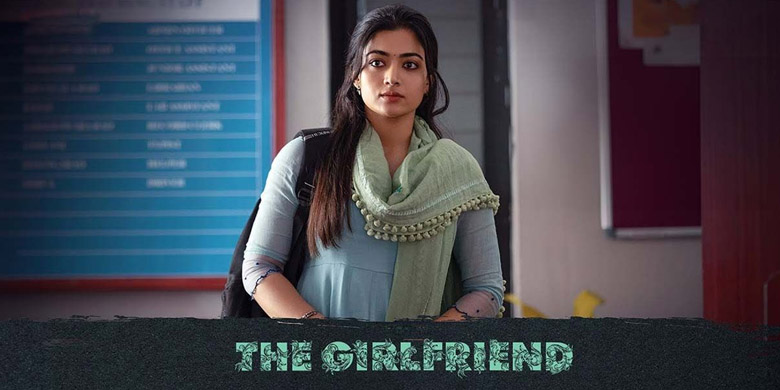“The cultural values are male; for a woman to say a man is funny is the equivalent of a man saying that a woman is pretty. Also, humor is largely aggressive and pre-emptive, and what’s more male than that?” Fran Lebowitz
The “general consensus” is that women are not funny. Such stereotypes are emboldened by hyperspecific research about men owning the funnier set of bones even as PCOS research remains underfunded, making it all an ironic specimen of absurd humour. In 2022, we can count Indian female comics on one hand, with the likes of Aditi Mittal, Sumukhi Suresh or Radhika Vaz breaking into the mainstream.
The comedy industry continues to be majorly male-dominated, leaving a niche of sardonic and dry humour for the women comics to occupy. Rewind 60 years and a young woman from Uttar Pradesh stepped out of the recording studio and into the silver screen as Bollywood’s first female comedian. With more than 150 films under her belt Uma Devi Khatri, better known as Tun Tun, became an icon of Indian cinema and its women, only soon to be forgotten.

Early life: Singer, artist, child of circumstances and will
Born in a village in Amroha district, Uttar Pradesh, Uma Devi Khatri was orphaned at a very young age. She grew up with a brother, in a village called Alipur, till his death left her destitute. Uma Devi lived a life of poverty and disrespect, working as a servant to her relatives, till she met Akhtar Abbas Kazi, an excise inspector of British India.
Partition successfully separated the two countries and as a result, the two friends. Kazi Saab, a guide and inspiration to Uma Devi Khatri, moved to Lahore. Uma Devi, a teenager then, ran away to Bombay to look for a fresh start. Akhtar Abbas Kazi, unable to adjust to Lahore, moved back to India, in Bombay, and they got married soon after. Sounds like a well-rounded fairytale, but this is only the prologue to her story.
Even as her male peers became social icons, and more easily accepted comics, Uma Devi continued on her path, unbothered and steady. Actors like Sashikala and Lalita Pawar occasionally did comedy roles but Tun Tun had secured her seat as the most iconic comic actor in Bollywood by the 60s. In the coming years, she was to work with every leading comic actor in Bollywood, her seniors and peers akin
Having already sung in ‘Wamiq Azra’ (1946), Uma Devi Khatri knocked on the door of director Abdur Rashid Kardar’s office, around the time that he was making ‘Dard’ (1947). Impressed with her candour, Kardar referred her to music director Naushad Ali’s office. Naushad Sahaab’s “Afsana likh rahi hoon dile beqarar” from ‘Dard’ (1947) and “Dilwale jal jal kar hi mar jana” from ‘Natak’ (1947), won Uma Devi the popularity to make her place in the industry.
She signed a contract with Kardar, but a year after, was caught in breach. She signed up for SS Vasan’s epic ‘Chandralekha’ (1948) which was seen as a violation of the contract with Kardar. She went on to sing for a few more years, but with the likes of Lata Mangeshkar, Geeta Dutt and Asha Bhonsle, rising as the voices of the industry, she soon decided to hang her cap. Uma Devi Khatri chose to restructure her life as a mother and homemaker, but only for a few months. Uma Devi, who had the aggressive confidence to walk into the office of a leading director and sign a contract with the same director in a year, was a force of nature not to be contained.

Re-entry as a comic
The family was growing and the single salary of her husband was struggling to bear its upkeep. Uma Devi Khatri turned to Naushad Ali, who had continued to be her mentor. He was working on the film ‘Babul’ at that time. Consulting the star of the film, Dilip Kumar, he offered her a comic role in the film. It was during this film that she was crowned with her screen name – Tun Tun.
‘Babul’ (1950) was only the start of Tun Tun’s journey that extended to the many films she went on to work in, always as comic relief. Stock comic characters in mainstream Hindi cinema are a staple today. Uma Devi Khatri was one the first female actor-comedienne to grace the screen. Jalal Agha, Sunder and Dhumal were the few other famous names known for comic roles.
Tun Tun soon became a household name. Uma Devi Khatri’s screen name gradually became synonymous with full-figured women. What did it mean to be a comic and a woman in Bollywood? To be allotted characters written at the expense of their weight. The comedy arose from the plight of a “fat and dark-skinned woman” – searching for love, and failing at tasks owing to her appearance. When the body of a woman, built for gaze and consumption, deviates from the man-made prototype, it needs to be punished or laughed at. Little has changed as today’s female comics pre-empt the mockery and laugh at their own body
Soon after Uma Devi’s appearance, followed the famous Johnny Walker, starting his career in 1951, Bhagwan Dada, famous for his role in Albela (1951), and Keshto Mukherjee, debuting in 1952. Uma Devi Khatri went on to make her mark with films like ‘Pyaasa’, ‘Aar Paar’ and ‘Mr & Mrs ‘55’.
Even as her male peers became social icons, and more easily accepted comics, Uma Devi continued on her path, unbothered and steady. Actors like Sashikala and Lalita Pawar occasionally did comedy roles but Tun Tun had secured her seat as the most iconic comic actor in Bollywood by the 60s. In the coming years, she was to work with every leading comic actor in Bollywood, her seniors and peers akin.

Tun Tun soon became a household name. Uma Devi Khatri’s screen name gradually became synonymous with full-figured women. What did it mean to be a comic and a woman in Bollywood? To be allotted characters written at the expense of their weight. The comedy arose from the plight of a “fat and dark-skinned woman” – searching for love, and failing at tasks owing to her appearance. When the body of a woman, built for gaze and consumption, deviates from the man-made prototype, it needs to be punished or laughed at. Little has changed as today’s female comics pre-empt the mockery and laugh at their own body.
Uma Devi Khatri’s remark about the stereotype stands out defiantly – “My bulk is my trump card. I don’t regret that I am fat. I’m lucky I was born this way.” In a world where such violence is cast upon the feminine form every day, this comment reads like a consolation, a self-soothing remark. Yet, her words are laced with bitter humour. She added, “However that does not mean that I am not in favour of dieting. I agree dieting is very essential to maintain a slim and healthy body.”
The words that carry a world of pain and sadness came last, “But where is the need for me to be slim and ravishingly beautiful?” With eyes that shone brightly, Uma Devi Khatri was happy to be held in her body that granted her money and fame. But it was the same body she had to maintain, despite health issues, because her career depended on her weight and shape. A talent who proved herself twice in the industry, as a singer and as an entertainer, had to bear the brunt of her appearance – the pioneering act of the first female comic.

First of her kind
It was the industry’s lack of imagination that could not harness Uma Devi Khatri’s talent beyond her physical appearance, busy catering to a society containing women within sample sizes, colours and purposes. Nevertheless, Tun Tun shone through, trailblazing her way into the hearts of thousands.
The only actor-comedienne of her time, she held her place in the obsessively masculine space, of comedy. Beloved and revered by generations of actors who came after her, her need in the industry ran out. She decided to retire after working in ‘Namak Halaal’ (1982) and was rarely seen after that, except for a few cameo appearances.
Uma Devi Khatri spent another 20 years of her life in quiet before passing away in 2004. Her characters, reeking of their writers’ misogyny, etched a path for women comics in India. Even as the comedy industry struggles today to recognise its women artists, Tun Tun’s story continues to be a testimony of resilience and a beacon of hope. Here is to taking the stereotypes used against us and playing them as our trump cards.
Also read: ‘You Will Be Believed’: Unchosen Suffering & My Evolving Relationship With My Body
About the author(s)
She/they is an editor and illustrator from the suburbs of Bengal. A student of literature and cinema, Sohini primarily looks at the world through the political lens of gender. They uprooted herself from their hometown to work for a livelihood, but has always returned to her roots for their most honest and intimate expressions. She finds it difficult to locate themself in the heteronormative matrix and self-admittedly continues to hang in limbo




